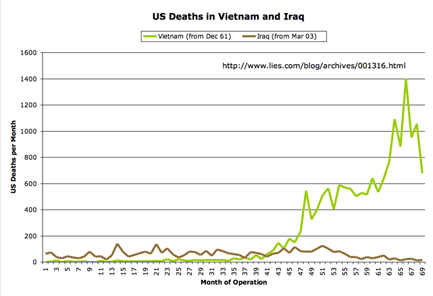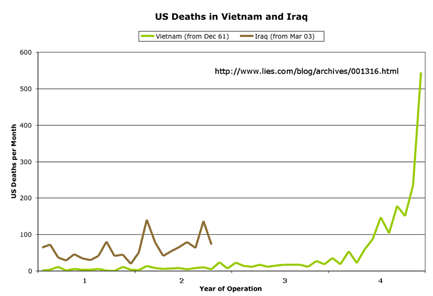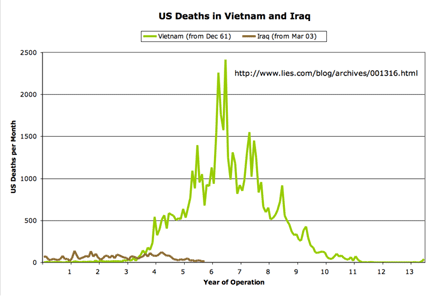I was interested by that recent article from Douglas Jehl at the New York Times (Report warned Bush team about intelligence suspicions). The story describes an intelligence report, recently declassified, that was circulating in early 2002 among top Bush administration officials, and which cast doubt on the allegations of al Qaeda/Iraq cooperation that had been made by captured al Qaeda bigwig Ibn al-Shaykh al-Libi.
See, after we captured al-Libi we handed him over to the Egyptian authorities so they could properly torture him, and it was that torture, apparently, that produced his “confession” of a high-level connection between Saddam and al Qaeda. And the experts who looked at that evidence thought it wasn’t credible, in part because when you torture somebody they’ll say whatever they think you want them to say so you’ll stop torturing them, and in part because the evidence just didn’t make much sense on its own merits.
And the Bush people basically knew this. But they used the information as part of their case for war anyway.
Sigh.
Much intelligent musing on the story from Kevin Drum: Torture and the vice president and Torture and the vice president, part 2. Also from Philosoraptor: Dick Cheney’s pro-torture crusade. And from the LA Times’ Nicole Gaouette: Prewar claims set off bells, and from the LA Times’ editorial writers: Tortured justifications.
There are a lot of good points to be made about this, and the people linked to above make many of them. There’s something else that struck me about this story, concerning the Bush administration’s “tell” (by which I mean, a characteristic sign that helps you spot that they’re lying).
(Cue the cheap shot: “Their lips move.”)
No, seriously. From the Gaouette article linked to above:
In an October 2002 speech in Cincinnati, President Bush said that “we’ve learned that Iraq has trained Al Qaeda members in bomb-making and poisons and gas.”
This sounds eerily like the infamous “16 words” from Bush’s State of the Union address the following January:
The British Government has learned that Saddam Hussein recently sought significant quantities of uranium from Africa.
In hindsight, knowing what we know now about how both pieces of information had been undercut within the Administration at the time the public statement was made, it’s possible to recognize a certain clever legalistic parsing going on. After all, as any number of Bush supporters are happy to point out to this day, neither statement is completely, hyper-technically untrue. In the same sense that Clinton could assert that he really hadn’t had sexual relations with that woman, Miss Lewinsky (because the legal definition he was operating under defined sex as touching another person on a list of proscribed body parts, and his claim was that he never actually touched any of her listed parts while she was fellating him), Bush could assert that he (or the British) had indeed “learned” certain things about Saddam, even if Bush had good reason to doubt those things based on information he’d subsequently received.
Just because he said he’d “learned” it, you see, doesn’t mean that he didn’t subsequently “unlearn” it. If the people listening to Bush’s statements chose to add the assumed clause, “…and I actually believe those things to be true today, based on an objective, good-faith analysis of the best evidence I currently possess,” well, that wasn’t Bush’s fault. Caveat emptor.
Note, though, that under this formulation, it would be equally honest if Bush were to stand at the podium during his next State of the Union address and solemnly inform the country, “We have learned that a fat man in a red suit climbs down millions of chimneys leaving presents for children on Christmas eve,” and “British authorities have learned that a magical rabbit hides brightly colored eggs just prior to Easter morning,” and “we’ve learned that a deft fairy replaces children’s lost teeth with money, if those teeth are left under the children’s pillows while they sleep at night.”
All true statements. At some point in our lives all of us (or at least many of us in my part of the world) have learned those things.
So now I’ve learned something else: When Bush says that he (or someone else) has learned something, it’s actually a good bet that it isn’t true.




